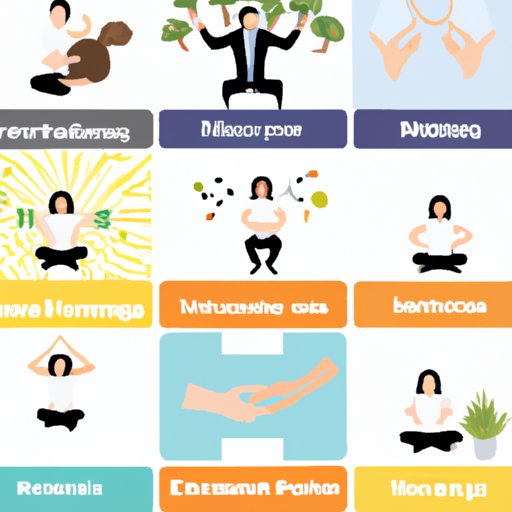Introduction
Stress is a normal part of life and can be caused by both positive and negative experiences. It is important to recognize that stress can have both short-term and long-term effects on our physical and mental health. Learning how to manage stress is an essential skill for living a healthy, balanced life.
Managing stress involves identifying its sources, developing healthy habits, practicing relaxation techniques, connecting with others and seeking professional help when needed.
Identifying the Sources of Stress
The first step in managing stress is to identify its sources. This can be difficult as many of the sources are not always obvious. Take some time to reflect on what has been causing you stress lately. Consider both external and internal factors such as work or school pressures, relationships, financial worries or negative self-talk.
Once you have identified the sources of your stress, it is important to create an action plan for dealing with them. This could involve making changes to your lifestyle, environment or attitude. It might also involve setting realistic goals and breaking down large tasks into smaller, more manageable ones.
Developing Healthy Habits
Developing healthy habits is an important part of managing stress. Eating a balanced diet, exercising regularly and getting enough sleep will all help to reduce stress levels. Research has shown that people who engage in regular physical activity also experience improved moods, increased energy levels and better sleep quality.
Eating a healthy diet is also important. Eating a variety of whole foods, avoiding processed foods and limiting caffeine and sugar intake can all help to reduce stress levels. Additionally, drinking plenty of water and avoiding alcohol and tobacco can help to keep your body hydrated and relaxed.
Practicing Relaxation Techniques
Relaxation techniques such as yoga, deep breathing and mindfulness can help to reduce stress levels. Yoga combines physical postures, breathing exercises and meditation to help relax the body and mind. Deep breathing involves taking slow, deep breaths from the diaphragm, which can help to calm the nervous system and reduce stress levels.
Mindfulness is another effective relaxation technique. It involves focusing on the present moment and being aware of one’s thoughts and feelings without judgement. Practicing mindfulness can help to reduce stress and improve overall wellbeing.
Connecting with Others
Connecting with others is another important way to reduce stress. Spending quality time with family and friends can help to reduce stress levels and improve overall wellbeing. Joining a support group can also be beneficial, as it can provide a safe space to talk about your concerns and receive support from others.
Seeking Professional Help
It is important to seek professional help if the stress becomes too overwhelming. When to seek professional help will depend on the individual and their circumstances. There are a number of different types of professional help available, including counselling, psychotherapy and medication.
These treatments can help to reduce stress and improve overall health and wellbeing. It is important to remember that professional help should always be sought if the stress becomes unmanageable or if other interventions do not seem to be working.
Conclusion
Stress can have both short-term and long-term effects on our physical and mental health. Learning how to manage stress is an essential skill for living a healthy, balanced life. This involves identifying the sources of stress, developing healthy habits, practicing relaxation techniques, connecting with others and seeking professional help when needed.
By following these strategies, it is possible to reduce stress levels and improve overall wellbeing. Remember to take care of yourself and seek professional help if the stress becomes unmanageable.
(Note: Is this article not meeting your expectations? Do you have knowledge or insights to share? Unlock new opportunities and expand your reach by joining our authors team. Click Registration to join us and share your expertise with our readers.)
